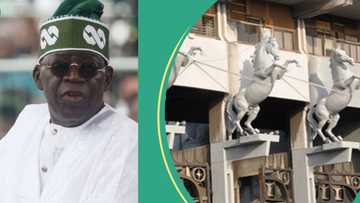FIRS Highlights How Wealthy Nigerians, Companies Evade Tax
- The FIRS has said that some wealthy Nigerians short-change federal and state governments of their tax revenue
- The Service said that unlike in Nigeria, the richest man in South Africa pays more in personal income tax
- It also noted that there are plans for greater revenue collection in the country
PAY ATTENTION: Click “See First” under the “Following” tab to see Legit.ng News on your Facebook News Feed!
According to the Federal Inland Revenue Service (FIRS), wealthy Nigerians and corporations understate their holdings, depriving the federal and state governments of tax revenues.
This information was revealed by Johannes Wojuola, the Special Assistant for Media and Communication to the Executive Chairman of FIRS, during a courtesy visit by the FIRS team to The Guardian's corporate headquarters in Lagos.
Recall that Legit.ng earlier reported that FIRS collected a total tax revenue of N5.5 trillion for a six-month period from January to June 2023.

Read also
Tinubu's government targets $17bn revenue from sale of TBS, refineries, other national assets, list emerges

Source: UGC
This came after FIRS set a new record, collecting over N10 trilion in revenue in 2022. It was the first time the revenue agency crossed the N10 trillion mark in tax revenue collection.
PAY ATTENTION: Join Legit.ng Telegram channel! Never miss important updates!
Wealthy individuals pay more tax in other African
Wojuola said that the richest individual in South Africa, who is also the second-richest person in all of Africa, paid more in personal income taxes than the combined internal revenue of all 36 states in Nigeria, casting doubt on the sincerity of the country's wealthy residents, according to The Guardian report.
Wojuola said, ironically, the richest man in Africa is a Nigerian, noting that most of the high-net-worth individuals have their assets outside the country.
He said:
Our system operates in a situation where the state government collects personal income tax. Whatever the wealthy people declare, the governor cannot tell them they are under-declaring except they do not want second terms in office.
He claimed that this is one of the concerns the FIRS is raising in relation to the reformation of the nation's tax systems through data harmonisation to enable greater revenue collection and the right individuals paying the correct taxes.
FIRS wants power to tax assets of Nigerians living abroad
According to Wojuola, the FIRS has also suggested that the federal government or the FIRS be given the authority to tax high net worth persons or the assets of Nigerian citizens abroad.
He contends that public servants and wealthy people cannot lead extravagant lives while urging the populace to do their share.
When this is accomplished, according to Wojuola, the precise money accrued to the nation will be collected.
He noted that with such a situation, we will not be having this unusual disparity where the second richest man in Africa is paying more tax than the entire IGR of all states in Nigeria that have the richest man.
He continued by saying that the committee headed by Taiwo Oyedele has been given the task of determining ways to lower the overall number of taxes collected in the nation and concentrate on those that generate the highest amounts of income.
Section 24 of the Federal Constitution requires every individual to legally report their income and pay taxes to the appropriate government agency, according to Olarinde Olufemi, Technical Assistant to the Executive Chairman of FIRS.
Nigeria, Cameroon, 8 Others Pay Highest Corporate Tax in Africa
Legit.ng earlier reported that the corporate tax rate is a significant source of revenue for governments around the world. Globally, corporate tax rates vary and reflect the distinct economic requirements of every nation.
It is a charge that the government levies against a company's income. Its amount is determined by the net profits businesses make from operating their businesses, often over one fiscal year.
Natural resource-rich nations, for instance, frequently derive the majority of their tax revenue from high corporate taxes on oil and natural gas corporations, allowing other industries to thrive in a setting with comparatively low taxes.
Source: Legit.ng




